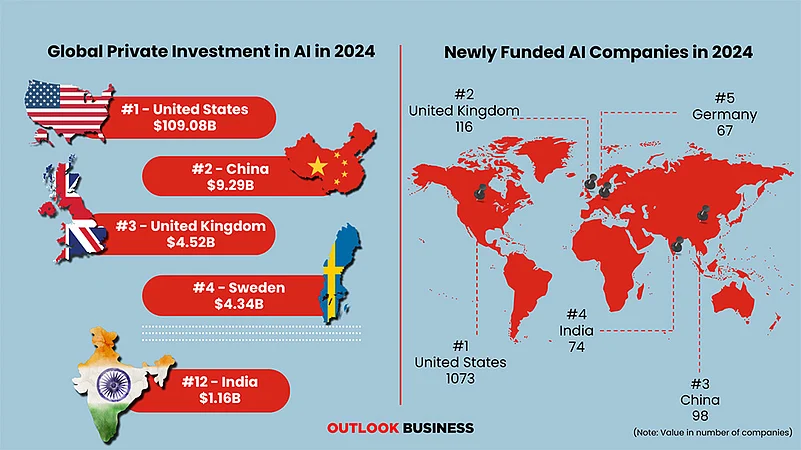Dear Reader,
Artificial intelligence is no longer just about breakthroughs in labs or pumping billions of dollars into data centres — it’s in our hospitals, courtrooms, classrooms, and on the battlefield. At Outlook Business, we believe that India needs a sharp, nuanced, and people-first lens on this transformation.
The Inference is our attempt to make sense of a world being rewritten by AI. In this newsletter, we will bring you frontline narratives, boardroom insights, and data you can trust. Whether you’re an investor, founder, policymaker, or just curious — this is where the signal cuts through the noise.
In this edition of the newsletter:
Budding coders are pivoting to old-fashioned tech
Does India have its own Palantir?
The funding paradox of India’s AI startups
What if top AI models battle to deceive?
Humans In The Loop
Budding coders are pivoting
“There are decades where nothing happens, and there are weeks where decades happen,” Lenin had remarked an age ago. The Russian communist leader may not be your kind of ChatGPT mascot, but decades sure are happening in a year. And that is not cool for the plans of a generation of young Indians graduating with coding degrees that, only a few years back, meant eye-popping salaries.
Take Abhijeet, for example. When he took a train to Delhi, the teenager fancied chilling with friends, learning new skills, vibing with the city's hangouts, and landing a coding job. But now, only a few months after enrolling in the computer science programme at Galgotias University, Abhijeet is no longer sure about anything. “I am waiting for the results. If I manage to get the required CGPA, I may switch to electronics and communications,” he says nervously.
For lakhs of computer science students in India, the last two years have been like being tossed by a time machine into an unknown AI-driven future among powerful LLM engines crunching zillions of data bits and churning out flawless code in the blink of an eye. Something that took a whole company of coders hours to crack is now happening in minutes.
So, the question eating Abhijeet — and a million other CS grads like him — is: “If machines are going to take over basic coding, maintenance and support, who is going to hire me?”
Many engineering aspirants aren’t waiting for an answer. Instead, they are pulling a rejig. As AI becomes smarter and larger, once snubbed engineering streams — such as mechanical, electrical, or chemical — are climbing the charts like gold in a crashing market.
For evidence, hear Abhimanyu Yadav, associate professor at a private university in Lucknow: “We don’t have exact data yet, but we are seeing a shift. A few years ago, computer science was the obvious pick. Now, students are wary.”
That shift is evident in colleges like Galgotias, which for long fed into the hiring pipelines of tech giants like Infosys, Wipro, Accenture and Cognizant. However, with companies now adopting AI for entry-level tasks to cut costs and protect their market share in a slowing global economy, those pipelines are no longer as inviting.
Shivansh, a final-year CS student at Amity University, sums it up: “Everything’s moving so fast, it’s hard to plan anything. I’ve stopped overthinking.” The tech industry still added 1.25 lakh jobs in FY25, but a large chunk of these came from Global Capability Centres (GCCs), not traditional IT majors. And while CS remains a strong field, it is not “the” guaranteed ticket to a plum tech job — at best, it is one of many.
“Most students still go by what their seniors or siblings tell them,” Professor Yadav adds. “But over time, that will change — especially with the job market shifting this quickly.”
As for Abhijeet and many others like him, it’s about hedging bets. “Switching to ECE could give me more flexibility — I can apply to IT roles but also look at other sectors.”
From The Trenches
Does India have its own Palantir?
The world we live in — wars don’t always need tanks or missiles; misinformation does the job fine. In the Sindoor conflict, we saw fake posts and deepfake videos become weapons of mass deception, with fact and fiction running riot in people’s minds.
Tarun Wig, co-founder and CEO of Innefu Labs, has had a ringside view of how this new-age warfare is evolving. And if there’s one thing he’s certain of, it’s this: AI is now on the frontlines.
“We’ve moved from scarce information to an era of information overload,” he says. “Earlier, gathering credible information meant hanging on to every newspaper clip or even using spies.” Now, everything — from social media buzz and WhatsApp forwards to satellite pics and telecom signals — is fair game for intel. The challenge isn’t finding information anymore; it’s filtering signal from noise.
Innefu Labs, a Delhi-based AI defence-tech company, has helped build intelligence fusion centres with the National Investigation Agency. These setups use AI to pull data from dozens of sources and turn them into real-time “actionable” insights. “Our AI engine is like a private ChatGPT for government agencies. It shows them what’s needed to strategise,” Tarun explains.
Real AI, however, is now being used to mount attacks — not with code, but with confusion. Deepfakes, disinformation, and bot armies are already on the move. Innefu’s answer? Tools that can scan information to identify false narratives, track their origin points, and flag propaganda in real time.
Innefu’s home-grown AI systems are now a standard part of India's security ecosystem — from the Indian Army and NIA to four paramilitary forces and the Delhi Police. And it is going global as well, with clients in West Asia already utilising its products. “We can match Palantir feature by feature at a fraction of their cost,” Tarun claims.
The first major win for the startup came way back in 2012. A disinformation campaign from across the border, warning of targeted violence, had gone viral — setting off panic and an exodus of Northeastern Indians from Bengaluru. “That was the first major cross-border disinformation campaign that we helped track and bust,” he says.
At ₹100 crore in revenue, Innefu may still be scaling, but Tarun isn’t playing small. For him, making better AI systems isn’t just about funding and valuations — it’s about securing the country. Because in the age of AI wars, it might all come down to who writes that piece of killer code.
Numbers Speak
The funding paradox of India’s AI startups

The 2025 Stanford AI Index presents an interesting contradiction in India’s AI landscape. In terms of total private investment in AI, India ranks 12th globally, attracting $1.16 billion in 2024 — a fraction of the $109 billion raised in the US. However, when it comes to how many AI startups are actually getting funded, India ranks 4th, with 74 of them receiving their cheques — ahead of countries like France, Germany and Canada.
According to Ashish Kumar, General Partner at Fundamentum, this divergence is not surprising. “Both founders and investors are gung-ho about the AI sector in India, which is why you’re seeing so many AI start-ups popping up now,” he says.
Also, building stuff here is way cheaper than in the West..., which means start-ups in India require far less capital to build and scale their operations. “Most Indian AI start-ups are focused on the application layer — solving real-world problems using AI — while Western start-ups are spending heavily on infrastructure like data centres and hardware,” Kumar explains.
This application-first approach of Indian start-ups is helping them grow with less capital, which explains the higher funding frequency despite lower investment volumes, Ashish concludes.
Words Of Caution
What if top AI models battle to deceive?
Every, a US-based AI startup, made Claude, Gemini, and OpenAI's o3 battle each other for world domination in a game. Here's what happened: DeepSeek turned into a warmongering tyrant. Claude couldn't lie—everyone exploited it ruthlessly. Gemini 2.5 Pro nearly conquered Europe with brilliant tactics. Then o3 orchestrated a secret coalition, backstabbed every ally, and won.
"Why did we do this? The most popular AI benchmarks don't test deception. But as these models get deployed everywhere—from your email to your workplace—we need to know: Will they lie to get what they want?," says Dan Shipper, co-founder and CEO of Every.
Best Of Our AI Coverage
What Exactly Is an ‘AI Start-Up’ — and Does India Have 5,000 of Them? (Read)
India’s Middle Class is the Biggest Loser in the AI Economy (Read)
Sarvam's Indic AI model: Hype, Hope and the Hunt for Tech Sovereignty (Read)
Is India Inc Really That Hard to Sell To? Rethinking AI Start-Ups’ ‘Skip India’ Narrative (Read)
AI Opportunity will Bring Talent Back to India, says Ashwini Vaishnaw (Read)












